Amongst these contemplating the acquisition of a brand new or used battery-electric or plug-in hybrid car, or simply interested in EVs, charging can nonetheless be the EV dealbreaker.
Until you don’t have a option to simply set up or entry dwelling charging, your excuses are shortly disappearing, although. In 2024 public charging saved tempo—or higher—with the variety of EVs on the highways. New EVs are charging faster and extra constantly in street journeys; the choices alongside the way in which have grow to be extra dependable; and with Tesla and different manufacturers’ EVs all quickly appropriate with the identical cost connectors, no one’s excluded.
That mentioned, retaining EVs charged requires a distinct mindset than you may use in fueling up gasoline automobiles—regardless that seeing electrical energy as gas isn’t off the mark.
A well-recognized start line for EV charging
When you’re an EV beginner, or somebody simply feeling out EV possession, you may stay up for a lifetime freed from gasoline. However so as to get pleasure from it and shed the nervousness, you’ll have to interrupt out of the running-on-empty and fill-’er-up mindsets of gasoline automobiles, changing it with the charge-nightly-or-as-you-can strategy you already use for smartphones or tablets.
Changing into snug with the routine of charging your EV—and when and the place you could plug in—is a crucial a part of possession. And all of it comes again to what’s seemingly in your pocket or proper subsequent to you, if you happen to’re not already studying this piece on it—your smartphone.

Rivian provides Tesla Superchargers to journey planning app
Over time, some folks be taught to have faith within the battery degree of their cellphone, keep watch over it, and easily plug it in when it will get down to twenty% or 10%—the low battery warning—whereas others get in a routine to plug in each night to cost up all or a lot of the means for the subsequent morning, relying on settings.
Whereas EV batteries are larger, and you’ll’t plug them in in every single place, retaining your EV charged up is all about what makes the perfect sense to you. Not everybody goes to return to the identical conclusions, and that’s high-quality as EV possession can match all types of routines, so long as you first perceive charging.
With that start line in thoughts, be forewarned: When you’re already an EV fan, a lot of this shall be outdated hat. However to make the transition straightforward, Inexperienced Automotive Reviews has rounded up some recommendations on how, the place, and when learn how to cost up that new plug-in car.
We’ve written this piece with the tech-curious newbies in thoughts—possibly not hitting all of the high-quality particulars, however serving to present a lay of the land as you shift away from gasoline and towards cost ports and ensure all fundamentals are in place.
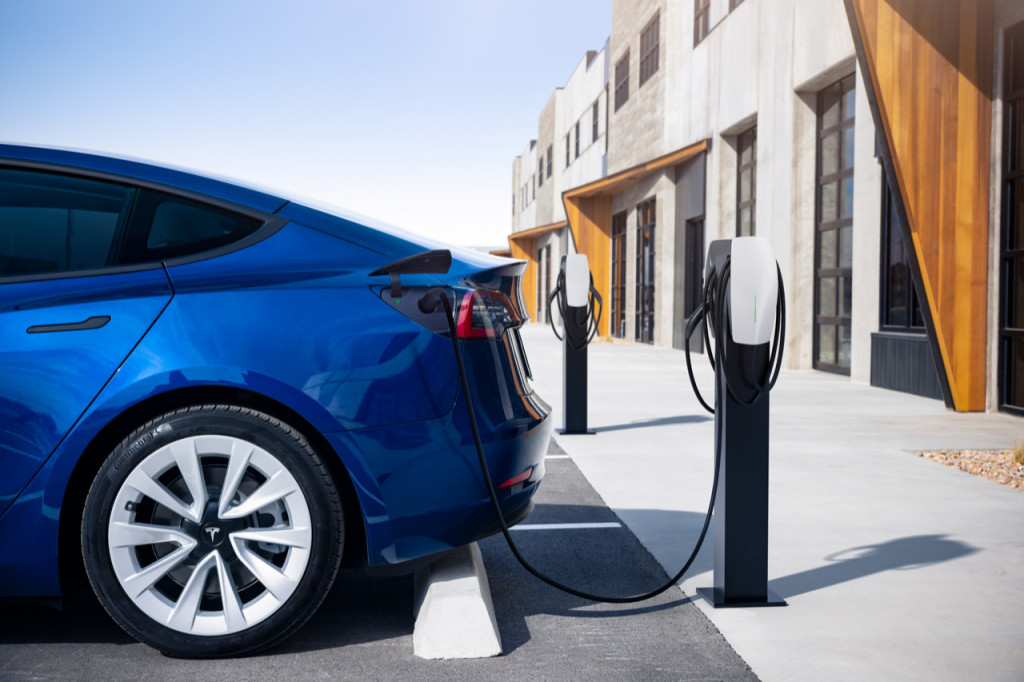
Tesla charging
Sorts of Charging
AC or DC
Essentially, there are two sorts of charging, based mostly on the format of the electrical energy—AC and DC.
AC (alternating present) is what’s provided to your own home or what flows by means of a industrial electrical outlet—or the “vacation spot chargers” that you just may plug into for a number of hours, or in a single day. Whether or not you plug into it by way of a cell connector or a wallbox, the precise charger that communicates with the battery and converts that AC present to DC (direct present) and is inside the car.
The cell connector or wallbox (generally known as EVSE for the sake of tax credit, rebates, or electrical work) will take a look at the circuit whenever you plug it in, to make sure that it is correctly grounded and the present is robust sufficient to energy the charger. Despite the fact that these connectors and wallboxes aren’t delivering the electrical energy in any totally different format than what the outlet supplies, they’re confusingly typically known as chargers.
DC itself, then again, is usually provided by industrial charging-station {hardware} designed for quick charging (or very particular makes use of like dwelling backup). {Hardware} delivers DC present to the car, with two-way communication fine-tuning precisely what voltage and present the battery pack will get in actual time to get the quickest cost with out overheating the pack or damaging it.
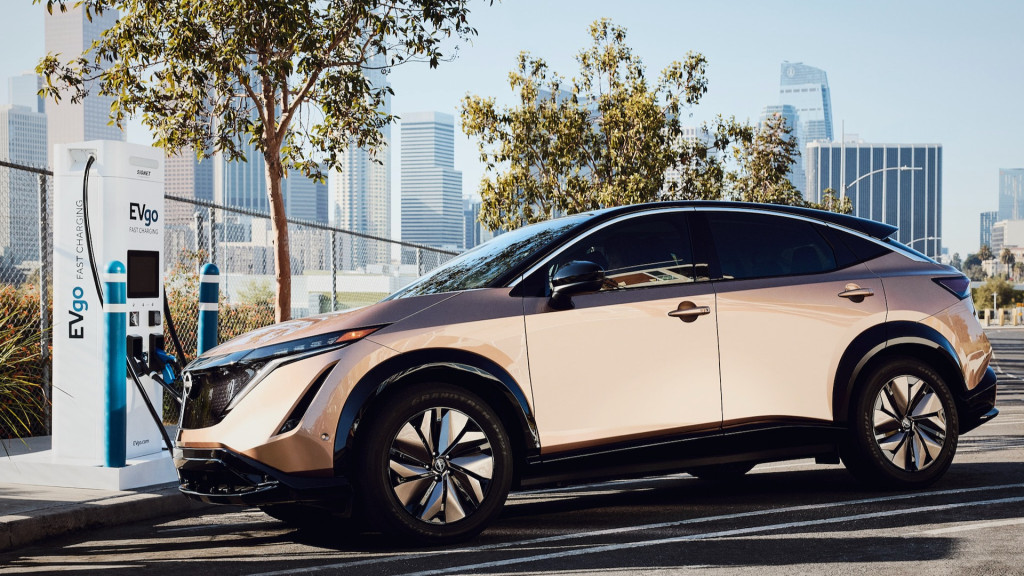
2023 Nissan Ariya at EVgo charging station
L1, L2, and L3
AC and DC charging breaks out into a variety of charges, which ends up in one other option to describe the sorts of charging: Stage 1 (L1), Stage 2 (L2), and Stage 3 (L3).
Take into account that these ranges are much less related in Europe, however they persist in North America, due to the way in which our AC electrical energy is delivered.
These roughly correspond to:
Stage 1: As much as 2.4 kw
Stage 2: 2.4 kw to 19.2 kw
Stage 3: 24 kw and up
Quick charging as we speak is shifting to seek advice from connectors able to delivering 150 kw or extra. Many charging station connectors stay restricted to 50 kw, and a few older {hardware} could solely be able to delivering 24 kw, however they nonetheless fall beneath what’s known as L3.
An L1 charging fee seemingly received’t be sufficient to maintain a completely electrical car adequately charged up at dwelling, until commutes are quick and it’s plugged within the overwhelming majority of the time in any other case. However it may be high-quality for a plug-in hybrid. These are inclined to correspond with 120V AC supply and thus are often restricted to 1.44 kw (120 volts x 12 amps — and we’ll get to why it’s 12A a bit later). Figuring in an inexpensive 10% losses, you’re solely placing about 1.3 kwh into the battery pack per hour—or about 5 miles of vary per hour in additional environment friendly EVs just like the Tesla Mannequin 3/Y or Chevy Bolt EV.
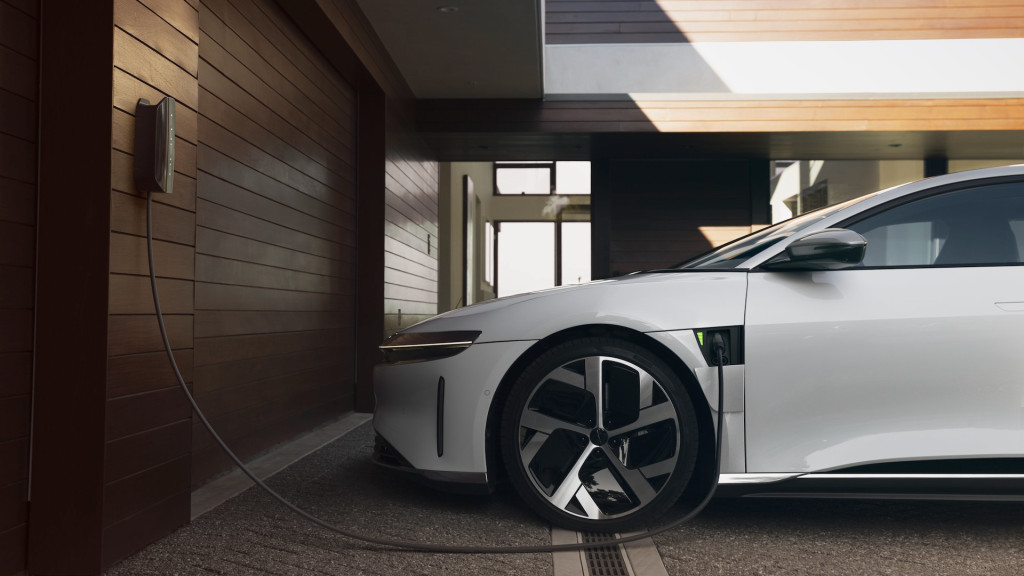
Lucid Related House Charging Station
L2 is the best and greatest choice to have for EVs, as it might present a full in a single day cost for practically all EVs—all however these with the most important battery packs. These are usually wallboxes and primarily correspond with 240V AC supply, and you probably have a charging station put in at dwelling, it can require the identical kind of wiring as an electrical range or garments dryer. Tesla, for example, factors to as much as 44 miles of vary recovered per hour from its Wall Connector.
EVs and plug-in hybrids have usually include a “charging wire” permitting you to plug into 120V AC and get that gradual L1 charging when wanted. However these actually weren’t used very often. So automakers have been switching towards 120V/240V cell connectors, that are as an alternative typically non-compulsory on new EVs (and customary on a number of premium-brand fashions) however do at an L2 fee add a really helpful quantity of vary you probably have entry to a spare 240V outlet. Tesla’s cell connector, for example, is proscribed to 32 amps, which corresponds to as much as 30 miles of vary recovered per hour for the Mannequin 3, in line with the automaker.
Within the curiosity of simplification L3 and DC quick charging are one and the identical. So preserve studying for that.

Subaru Solterra EV at Electrify America
DC fast-charging fundamentals
Quick chargers ship direct present to your battery pack, whereas speaking along with your car. By various the voltage and present, and accommodating for particulars like battery temperature and ambient temp, quick chargers ship as a lot energy as your battery can deal with at a given state of cost—as much as the rated most of the connector, wire, and charging cupboard.
That successfully implies that if you happen to select a charging location and connector rated at or above your car’s most, typically, the {hardware} will be capable to cost your car up in as little time as potential.
However the cells have to be in a great temperature zone to hit that peak fee. So main as much as a fast-charge session (and in lots of instances linked to its route planner), your car could precondition its battery pack—which suggests heat it as much as the low finish of the perfect zone. They’ll warmth up extra when charging.
In a DC fast-charging session, the cost fee tends to gradual as you strategy about 80%. For that reason, automakers usually give fast-charging instances from 10-80%—a great window to hunt on lengthy street journeys. Sadly that’s solely 70% of the vary, so for example to spend the least time charging you’ll have to cease about each 175 miles in a car that may go 250 miles on a full cost at real-world freeway speeds (which could correspond to an EPA vary score of 300 miles or extra).
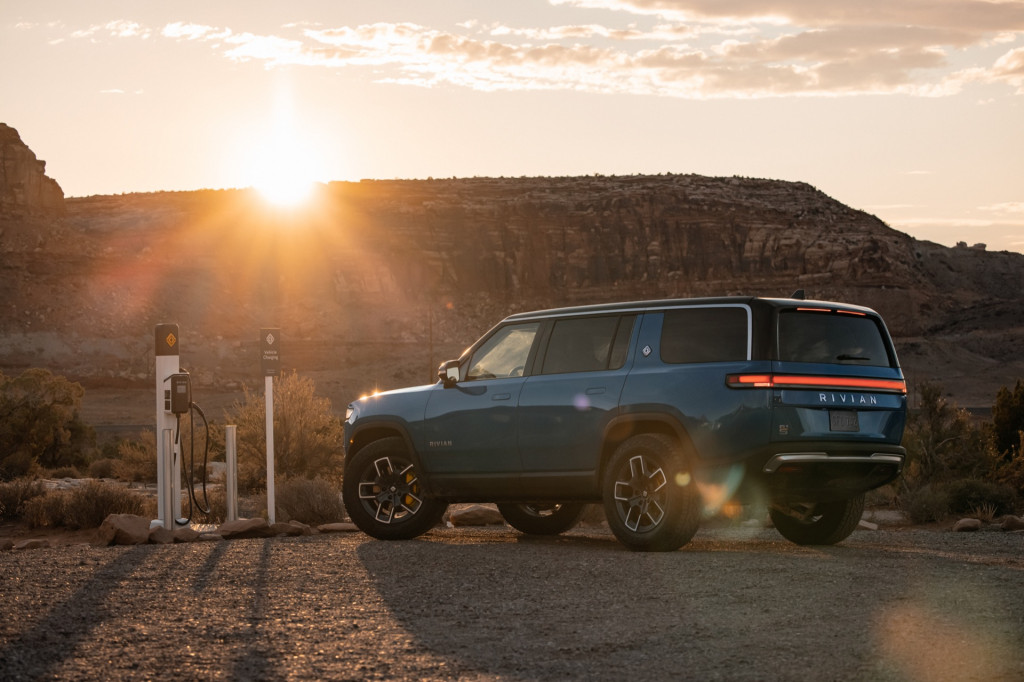
Below Canvas carbon-conscious camp with Rivian Waypoint chargers – Moab
The place to cost: House, vacation spot, and quick chargers
Distilling AC and DC, L1, L2, and L3 right down to some key factors, what it quantities to for real-world use is that there are three key sorts of chargers at which to cost:
- House chargers, or those who you retain at dwelling or in your trunk (or frunk)
- Vacation spot chargers—typically which means Stage 2 chargers which may be on the office, a shopping mall, or a parking storage and supply a major cost in a number of hours
- Quick chargers which can be almost certainly alongside freeway road-trip routes, to supply a major cost in lower than an hour

2024 Volkswagen ID.4
Find out how to discover chargers
We strongly advocate that you’ve got, on the prepared, a mix of strategies to seek out your greatest charging-station choices. So in your smartphone, set up not simply the official model app on your car but in addition an unbiased app centered on charging and route planning.
Most of as we speak’s EVs do include some degree of charger-savvy route planning that comes with dynamic vary estimates. Not all automaker apps and interfaces present the instruments for the quickest EV street journeys, although. Impartial EV charging apps we advocate for backing up your in-car interface and ensuring you’re selecting the perfect stops alongside the way in which embody Chargeway, PlugShare, and A Higher Route Planner. Google Maps and Apple Maps do additionally now embody some charger specs.
You’ll then have to provoke the charging session—and pay for it, in lots of instances. Though within the case of Tesla, you’ll seemingly solely have to plug in. For these with different EVs, Plug & Cost know-how permits an identical degree of comfort though it’s not but working in every single place. In different instances you might want to supply a credit-card swipe or smartphone-based cost, however general the times of separate playing cards, apps, fobs, and passkeys for every charging community are fortunately on the way in which to the historical past books—thanks partially to the federal authorities’s NEVI guidelines.
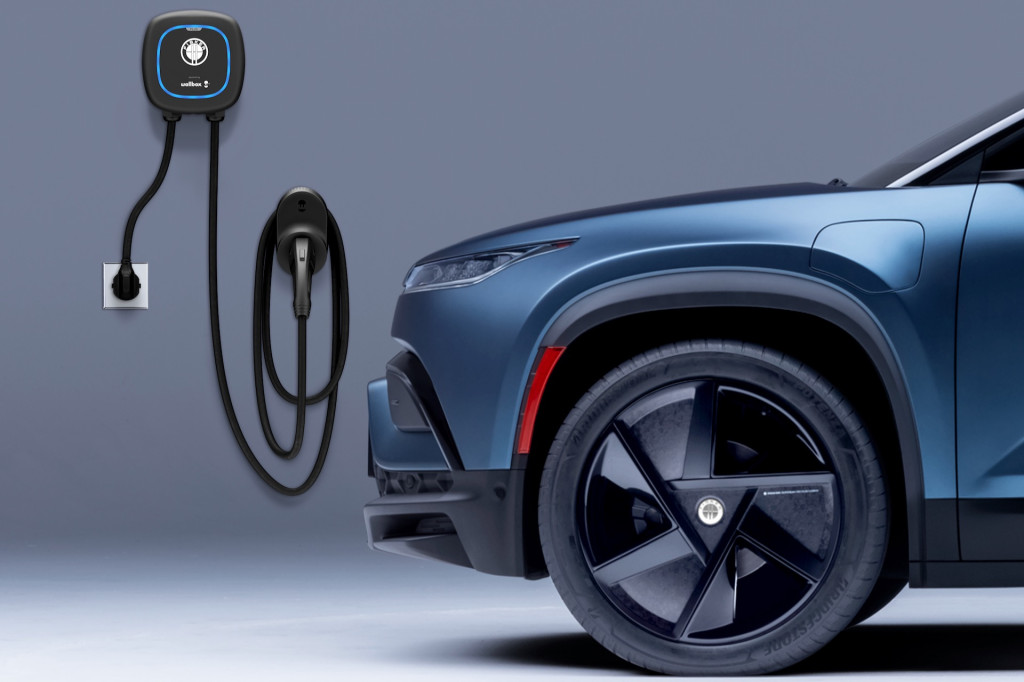
Fisker Wallbox dwelling charger
Putting in a house charger
For all of those dwelling chargers, whether or not they’re plugged into the suitable socket or hardwired, the 80% rule applies—which means that you just shouldn’t be pulling a relentless load that exceeds greater than 80% of the max your circuit is wired for. So for example, for a 50-amp circuit, you ought to be utilizing a charger that received’t pull greater than 40 amps.
A few of as we speak’s long-range EVs are able to charging at as much as 19.2 kw, which signifies an 80-amp cost connector, requiring (given the 80% rule) a 100-amp circuit. With 200-amp service for the complete home fairly widespread as we speak, and a few smaller or older properties working on 125 amps or much less, that’s an untenable quantity to dedicate to EV charging with out main (and dear) electrical upgrades.
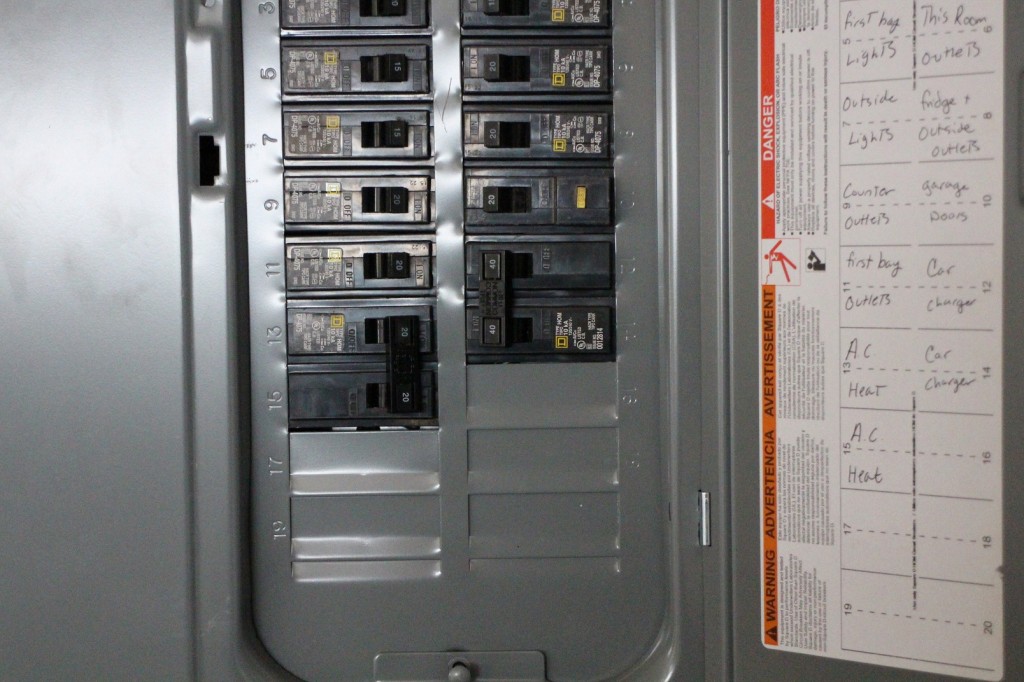
Circuit-breaker field displaying 240-Volt circuit for electric-car charging station
To be completely pragmatic, a 40-amp circuit and 32-amp dwelling cost connector shall be simply high-quality, and lots enough for many EVs—amounting to a cost energy of as much as 7.7 kw. Even for a lot of longer-range EVs, that’s sufficient for a full cost in 10-14 hours if you happen to’re close to zero cost remaining.
However step up the circuit if you happen to can. A 60-amp circuit and 48-amp charger, for example, will get you added pace for a number of the largest electrical vans or longer-range EVs, and shifting all the way in which as much as 100 amps for the circuit and 80 amps for the charger could have benefits for some fashions.
One ultimate observe: It seemingly makes way more sense to put in a 100-amp circuit versus including two separate 50-amp circuits, as there are twin chargers that can break up obtainable amps between EVs. However there are load-balancing and power-sharing choices, too. Discuss to your electrician.
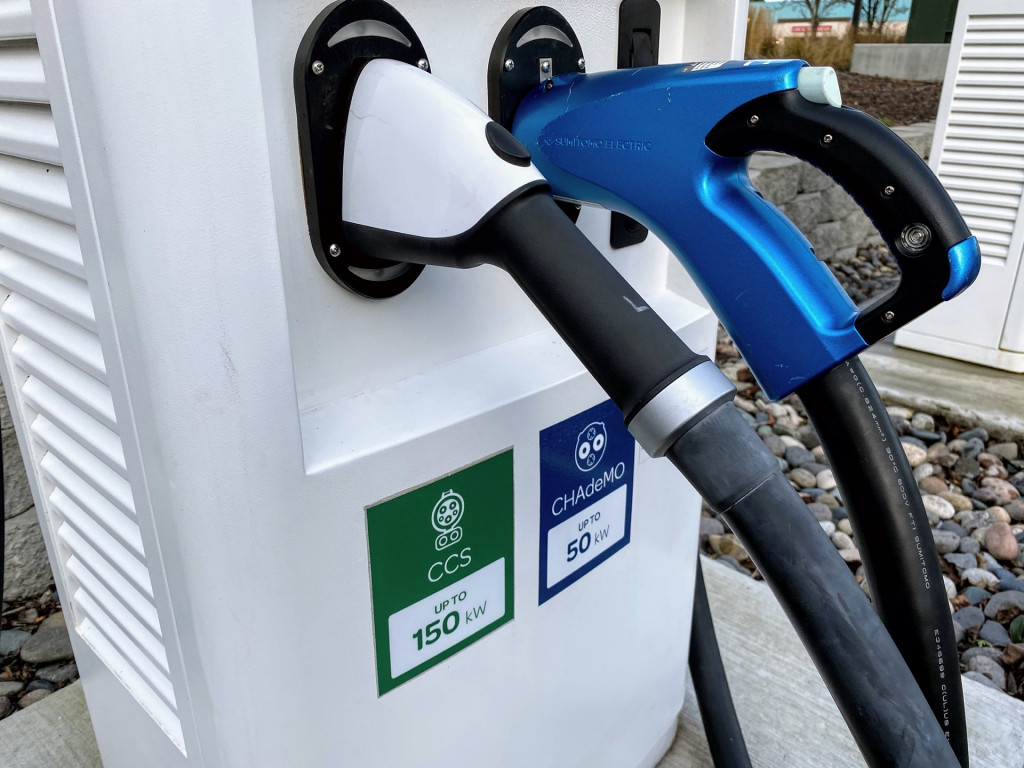
Electrify America DC fast-chargers – CCS and CHAdeMO
Cost connectors—J1772, NACS, CCS, CHAdeMO
A few of as we speak’s EVs include one cost port, whereas others include two. The rationale behind that is associated to AC and DC charging, nevertheless it’s just a little extra difficult than that.
Most AC charging comes by way of the spherical J1772 cost port—the “J” plug that’s grow to be near-universal over the previous 15 years in EVs and plug-in hybrids. The identical port spans L1 and L2 charging, as much as about 19.2 kw.

U.S. market EV charging connectors – by way of ChargePoint
CCS. The Mixed Charging System, within the type People understand it, is that very same J1772 port, with two stout DC-charging prongs added simply beneath, to allow Stage 3 DC quick charging (or maybe, in bidirectional charging setups, different slower sorts of DC energy sharing). Within the U.S., CCS arrived in late 2013.
NACS. The North American Charging System, or J3400 because it was termed as an industry-wide customary in 2023, is an adoption and evolution of the Tesla cost port that’s been used for the reason that introduction of the Mannequin S in 2012. NACS is noteworthy for the way it combines AC and DC charging collectively in the identical compact cost port that some could merely discover simpler to make use of.
CHAdeMO. Conceived in 2009 and 2010 by a gaggle of Japanese corporations, CHAdeMO was first rolled out for the U.S. within the 2011 Nissan Leaf. The one two new automobiles utilizing the CHAdeMO port in 2024 are the Nissan Leaf EV and Mitsubishi Outlander Plug-In Hybrid. Whereas the port and customary had been forward of the curve with bidirectional charging absolutely enabled beginning in 2013, CHAdeMO was shunned in Europe. What’s additionally been rendering CHAdeMO moot is that the massive, spherical port doesn’t embody AC/L2 charging—so in EVs the J1772 port must be included individually.
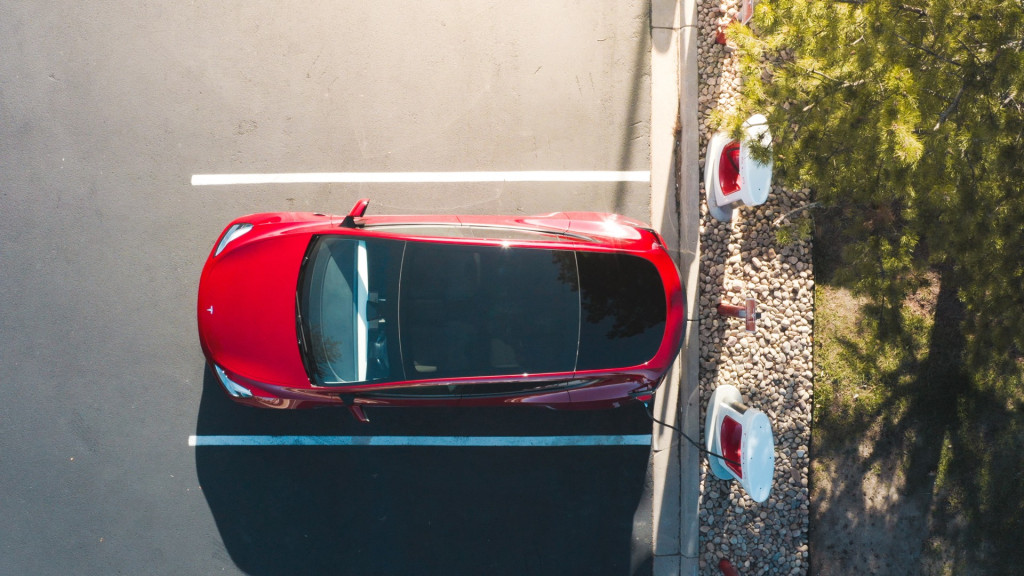
Tesla Supercharger
NACS or CCS: Two takeaways
The way forward for American EV charging is NACS. All through 2023, beginning with Ford, each single quantity U.S. automaker dedicated to the Tesla-based NACS format for future EVs—and, within the meantime, entry to the Tesla Supercharger community with CCS-NACS plug adapters. However many of those EVs that change to that format aren’t due till later in 2025 or 2026,
Get used to adapters. Whereas the longer term is NACS, you might be completely high-quality with CCS for dwelling charging for a few years to return. When you depend on public charging, even on street journeys, you’ll in all probability wish to have an accepted adapter readily available.
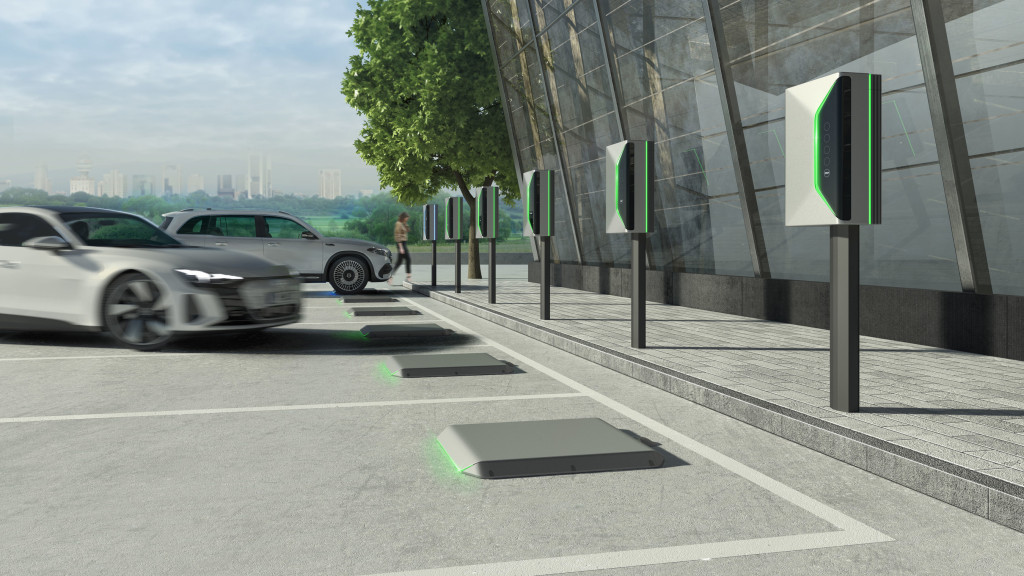
WiTricity and Siemens wi-fi charging station
A number of the way forward for charging shall be wi-fi
Cables and connectors may all the time stay a means of charging your EV, however they received’t be the one means. The know-how for absolutely wi-fi car charging—also called inductive charging—has already arrived, and if you happen to quick ahead a number of years into the longer term it’s fairly seemingly some U.S. EV drivers received’t ever want to fret about remembering to bodily plug in every evening.
The know-how depends on a set of copper coils at both finish—one in a pad on the storage ground, driveway, or parking house, the opposite on the backside of the EV. The decrease pad creates an oscillating magnetic area, which is then captured by the automotive’s coil and transformed again to electrical energy.
Why isn’t it in every single place? For one, it’s costly, with the worth tag of a whole wi-fi charging set up costing a number of instances what a wallbox prices. When luxurious EVs—and Tesla—undertake wi-fi charging, they’ll pave the way in which to economies of scale, and finally public wi-fi charging stations that may make your street journey even simpler.
Quick ahead even farther into the longer term and dynamic inductive charging may imply that some EVs, on sure routes, may by no means have to cease to cost—because the tech may progressively cost your car as you drive, by means of smaller embedded coils within the street.
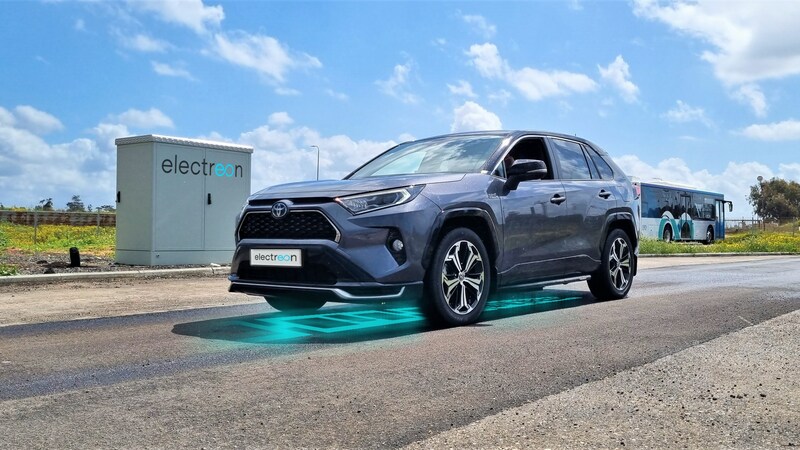
Toyota RAV4 Prime – Electreon dynamic wi-fi charging
Bidirectional charging is the wildcard
Normally, as we speak, EV charging includes vitality stream in a single path—from the grid to your car. However sooner or later there may be rather more give-and-take to charging as EVs, dwelling {hardware}, and your public utility, maybe, embrace bidirectional charging. With it, known as out as V2H (car to dwelling), V2G (car to grid), V2X (car to every little thing), EVs may ship energy out to campsites or development websites, energy properties throughout brownouts or blackouts, or assist steadiness vitality at totally different prices or totally different ranges of demand.
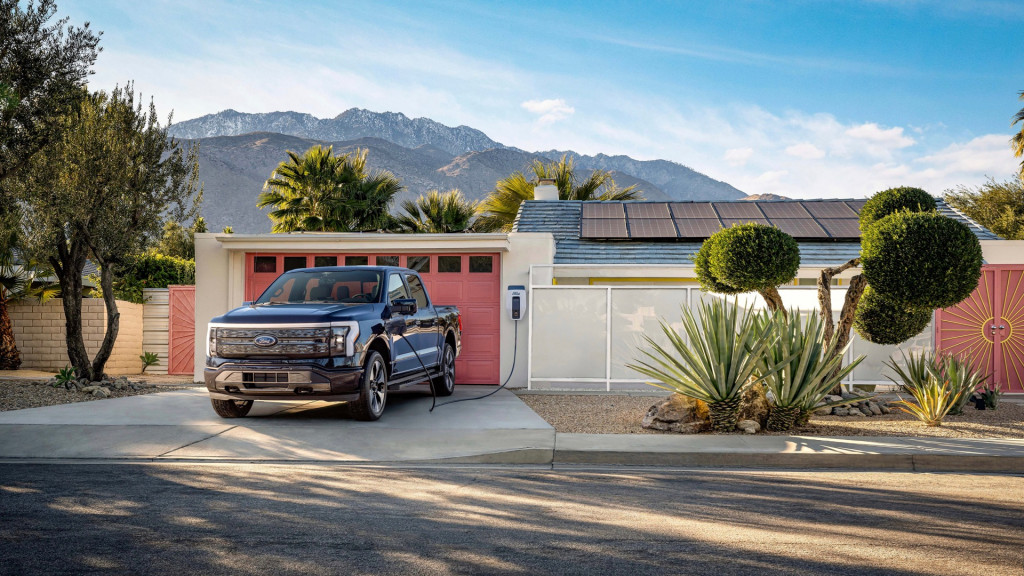
2022 Ford F-150 Lightning Clever Backup Energy
Farther off, a variety of corporations, with totally different phrases, technical variations, and proposed guidelines, have floated the thought of an “open market” for bidirectional charging—in small quantities, over wi-fi charging. As an example, possibly the grocery retailer borrows only a kilowatt-hour or two from a lot of the automobiles within the lot—wirelessly, based mostly in your settings—and in return provides you a reduction for reducing its use of costlier grid electrical energy on a sizzling afternoon.
Some types of bidirectional charging are right here proper now. CHAdeMO has been absolutely appropriate with bidirectional charging for greater than a decade, with the fitting {hardware} and software program, after all. CCS has additionally supplied this functionality for a number of years. Basic Motors has expanded bidirectional charging functionality to the complete GM EV lineup and it’s readied a GM Vitality ecosystem together with vitality storage. And at current, the Ford F-150 Lightning, Nissan Leaf, and Kia EV9 and EV6 are among the many EVs which can be appropriate with a minimum of some bidirectional {hardware}. In 2023 Tesla mentioned that inside about two years—that’s this 12 months—all Teslas will get bidirectional charging performance.

charging etiquette observe – DC quick charger, Olympia WA
P.S. Don’t neglect your manners: EV charger etiquette
The objective is for all of us simply to get alongside.
Inexperienced Automotive Reviews has dug into this problem way more up to now, when driving an EV felt like an unique membership of tech early adopters within the know. In 2025, it’s a really totally different scene than it was in say 2015—and the times of leaving passive-aggressive Submit-It notes on automobiles or distributing zines to fellow EV drivers (I’ve seen each) are principally left to tales of the way it was. However some guidelines of politeness maintain as a lot now as then.
Don’t overstay your welcome. At the start, just be sure you do not occupy the house longer than it takes your automotive to recharge. You wouldn’t abandon your automotive at a gasoline pump when it’s not fueling, would you? Most charging networks cost idle charges if you happen to stay plugged in, and charging spots aren’t there to supply parking.
Match EV and connector. When you can keep away from it, don’t use a connector/charger rated at a lot larger energy than your EV can benefit from. So Chevy Bolt EV homeowners, please don’t use the 350-kw connectors, if you happen to can keep away from it, whereas the Lucid Air or Chevy Silverado EV drivers who could make full use of it wait.
Respect! Don’t unplug anybody’s car till the cost is full, even when it’s simply to insert the 5 minutes of charging you could get dwelling. Most EVs have interlocks that allow you to select whether or not or not releasing the cost port requires the important thing current, so ensure you know your car.


